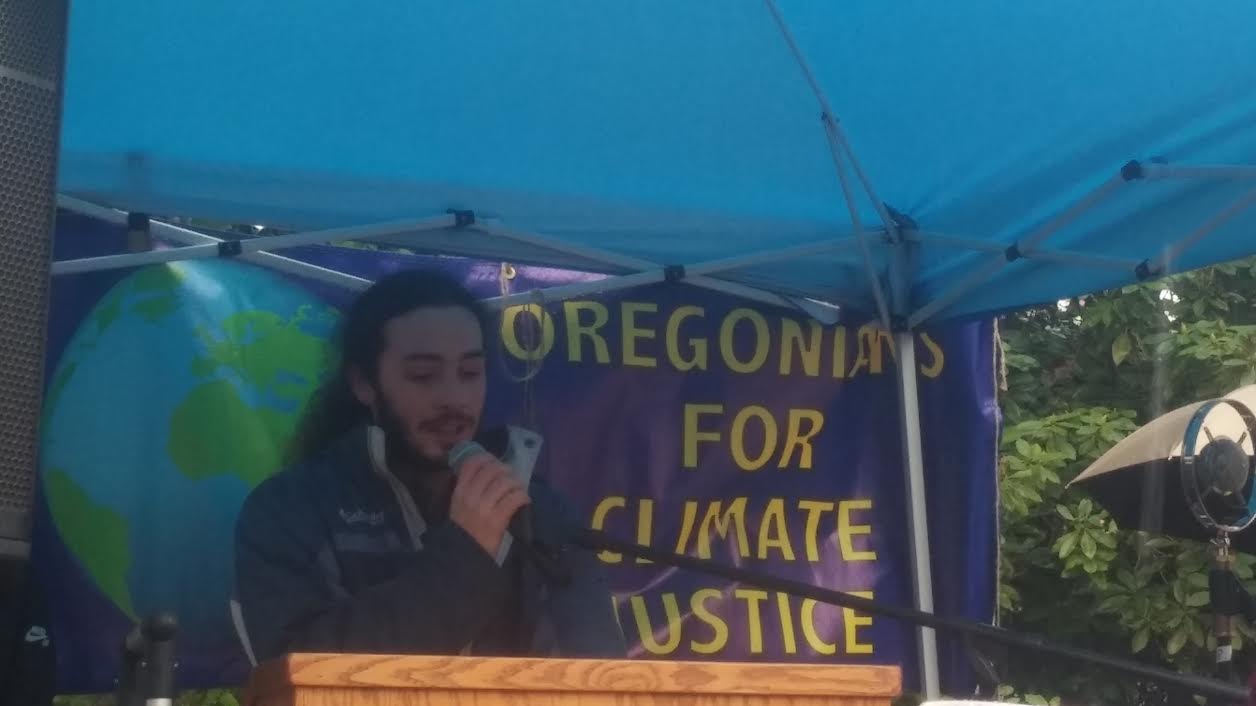February 3 saw an inspiring and energetic day of action in Salem, Oregon, as residents and activists from the Sierra Club, 350 Oregon, and the Oregon League of Conservation Voters congregated at the steps of the Capitol building to testify in a Senate hearing in favor of what is being touted as one of the strongest pro-climate bills in Oregon legislature. The ensuing rally was unprecedented in size, drawing over 220 participants and approximately 400 attended the Senate hearing.
Oregon’s coal calamity stems from the fact that a third of its electricity comes from coal-burning power plants. In addition to the devastating climate and health impacts, all of the state’s coal money is being invested out of state, with plants in Utah, Wyoming, and Colorado reaping the vast majority of Oregon’s ratepayer dollars, with plants in Arizona and Montana also contributing. Pacific Power, the second- largest utility company in the state, usurps up to two thirds of this energy, demonstrating the need for a transitional switch to in-state and renewable energy sources.
Current legislative action on a state clean energy bill, HB 4036, began on January 27, with public hearings occurring over the past two weeks. The Senate meeting was convened in order to reassess and update guidelines for moving towards a clean energy policy that was originally laid out in 2007. The Clean Electricity and Coal Transition Bill (HB 4036) would transition Oregon away from coal-fired power while increasing commitments to new renewable energy sources by 50 percent.
If the bill is enacted, by 2030 Oregon would eliminate coal from its electrical supply, allow greater access to solar power--primarily in low-income areas or for people who lack the ability to install solar from where they live via community solar initiatives--and support infrastructure for electric vehicles. This series of steps will aid in the upgrading of the state’s Renewable Portfolio Standard by 2040 for the aforementioned renewable energy source acquisition.
On February 15, HB 4036 passed in the House of Representatives with a strong bipartisan vote of 39-20, capturing five Republican votes--a testament to western Oregon’s strongly pro-environmental demographic. However, Oregon’s Public Utility Commission has erected a roadblock in stating publicly that this bill is too much too soon.
The lack of support from the Public Utility Commission--along with the concerns of some House Republicans that the bill is too complex and far-reaching for a short session-- will definitely carry over and cause problems in the Senate. Current projections in the state legislature reveal that it would be difficult to garner any Republican votes in the Senate and get at least one Democrat to vote no, leaving a very slim margin to pass the bill.
On February 22, a public hearing and work session was held to further discuss the bill in the Senate and how it will impact the future of Oregon’s transportation sector. Senators Lee Bayer (D), Fred Girod (R), Rod Monroe (D), Chuck Riley (D), and Chuck Thomsen(R) served as the review board, with chair, vice-chair, and two member positions being filled.
After a second reading and recommendation the following week, on March 2 the Clean Electricity and Coal Transition Plan passed in the Senate with a vote of 17-12. Amy Hojnowski, an organizer with Sierra Club’s Beyond Coal campaign, extols the significance of the bill’s implementation.
“After two-plus years of work crafting the policy, educating legislators and ratepayers, building a broad and diverse coalition, and much, much more, our legislative campaign has succeeded today,” she says. “Oregon will remove coal from our grid by 2030 and double our clean energy standard to 50% by 2040.”
The policy reaffirms the state’s commitment to energy efficiency programs, supports electric vehicle infrastructure, increases residential solar with a special designation to low-income communities, and bolsters small, community-scale renewable projects. The bill is expected to reduce carbon pollution across the West by 30 million metric tons -- the equivalent of taking 6.4 million cars off the road.
Culminating over a decade of coal campaign work by the Sierra Club, the passing of this act represents the single largest state-level legislative victory for climate in the United States since December’s Paris COP 21 meeting. Recent polling showed 70 percent of Oregonians support this policy and are ready for a transition from coal to clean energy.
